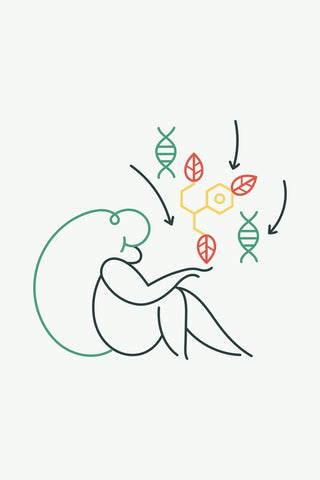Matcha The Powerful Elixer - 23 Surprising Health Benefits

Matcha Mindfulness: Elevates Your Cognition
That Green Energy Boost
- Matcha, like coffee, helps provide consumers with energy. An effect particularly sought after by many adults. We have all had rough, sleepless nights, struggling to remain conscious and productive, while practically crawling, incoherently, to the nearest coffee machine come morning.
Mechanism:
Matcha contains alkaloids such as caffeine, theanine, theophylline and theobromine which all have stimulant properties which is what is responsible for the energetic feeling one gets after consuming tea or coffee. In fact, matcha has a rather high caffeine content compared to other green tea varieties, as caffeine goes through decrements in concentration as the leaves are oxidized; a phenomenon largely removed in the way matcha is processed after harvesting. Matcha (1) has around 19-44 mg/g while coffee contains approximately 96 mg/cup. This lower caffeine quantity and the modulating effects of the amino acid theanine, results in a gentle boost followed by a slow decline in energy, avoiding a caffeine-crash.
Concentration and Focus
- Matcha can edge up performance capacity by increasing mental acuity, cognitive (2) functioning, memory and concentration. This is perfect if you need to work, study or otherwise perform a laborious task. Speaking from experience, drinking a delicious, steaming cup of green tea promotes mindfulness and reflection.
Mechanism:
Green tea contains antioxidants called catechins such as EGCG (epigallocatechin Gallate) which helps to prevent oxidative stress and damage that impairs cognitive functioning. Theanine and caffeine also help to improve acuity, energy and also has effects on certain neurotransmitters implicated in learning such as acetylcholine, serotonin and dopamine. You can check out our matcha collection and get yours now!
Stress Less, Drink Matcha
- If you ever feel full of anxiety and depression, let’s divulge a little-known secret, matcha may help reduce your stress!
Mechanism:
Matcha (3) contains EGCG and the amino acids theanine, glutamic acid and arginine in the tea leaves, which interact to modulate neural brain activity, and reduce anxiety and stress by balancing two main neurotransmitters: glutamate (excites the brain), GABA (calms the brain). Though tea is naturally caffeinated, these other components help control its stimulating effects, to reduce stress without outright causing sedation.
Blissful Slumber
- Contrary to what you may think, a cup of matcha may actually help you catch some zzz's at bedtime due to the mechanisms mentioned in the previous point. Even so, I don’t think drinking caffeinated tea just prior to sleep would be advisable! But hey, don't just take my word for it, you can try our Ceremonial Matcha Gold Class and see for yourself!
Fights Cognitive Decline
- Sometimes life presents significant tribulations that may make you feel like you are losing your marbles. In fact, when you become a parent, this feeling of insanity often feels like a constant state of ebb and flow. Jokes aside, there are medical conditions that cause decrements in cognitive and motor function due to loss of brain matter.
Neurodegenerative (4) diseases are an array of conditions that result in progressive loss and death of brain matter in certain areas; examples of this include Parkinson’s and Alzheimer’s disease, each having their own etiology and clinical presentations.
Mechanism:
Green tea contains various antioxidants which prevent fat oxidation (fat is plentiful in the brain), and cell damage. Additionally, the catechins such as EGCG have been shown to prevent the destruction of dopaminergic neurons in Parkinson’s, and to prevent the cytotoxic effects of protein sludge accumulation in the brain, termed beta-amyloid plaques, which causes destruction of brain matter in Alzheimer's.

Matcha Fortifies Your Body
Fight the Fat
- If you are at all acquainted with the weight loss/supplement aisle in your local supermarket, you will recognize that green tea is a star player in many formulations, and for good reason. Though there is no salient alternative for a healthy diet, calorie deficit and exercise, incorporating green tea into a daily lifestyle pattern can make a slimming difference.
Mechanism:
The caffeine and EGCG contained within green tea are proposed to liberate fat from storage through a process called lipolysis where it is then oxidized for energy thereby reducing body fat, especially when combined with physical activity.
Pre-Workout Drink?
- Piecing together some of the previously mentioned characteristics, it seems matcha increases focus, concentration, energy, reduces fatigue, and optimizes energy metabolism (fat and glucose). It also helps to increase blood flow, as well as reaction time which inherently makes it useful for physical pursuits as an ergogenic aid. If you're feeling sluggish, try a cold Matcha brew and feed those gains!
Beautifying Skin
- Face it, we've seen countless green facemasks on social media posts. That's because Matcha may also assist in improving the visual appearance of skin (14) and may protect it against damage, especially that which is precipitated by the sun.
A ghostly veil is not the only way to use Matcha for better skin. Green tea consumption and topical application of EGCG can improve the appearance and health of skin in various ways:
Sun damage
Matcha application on the skin and drinking it as well, helps decrease symptoms of photoaging caused by sun exposure. The sun can actually degrade collagen fibers in the skin, causing premature wrinkling and accelerating visible aging, which this helps prevent. Though, I would still certainly stick to my sunscreen!
Redness
Excessive and prolonged sun exposure can cause you to look red and blotchy, or scientifically termed erythema, if you are fancy. This can cause redness from dilated blood vessels in the skin, and sunburns. Though unsightly, this can also increase the probability of someone developing skin cancer. Green tea helps to assuage and decrease inflammation and oxidative damage which also contributes to cancer risk.
Acne
There is also preliminary evidence to suggest that ECGC extract may lower oil or sebum production that contributes to oily skin and acne (1). Green tea also has antibacterial and anti-inflammatory properties as well, that conceivably could contribute to combating acne.
Combats Inflammation
- We are all familiar with the redness, swelling and pain associated with injury; this phenomenon is termed inflammation, and it is a natural and normal process required to fight disease and mend injuries. When it fails to resolve however, chronic diseases may follow.
Mechanism:
Matcha, as you well know by now, contains antioxidants...lots of them! Antioxidants are vital to neutralize and clean up debris and reactive compounds which would otherwise damage tissues and adversely impact the organs with which they are associated. This has utility in assisting with numerous functions as we will see.
Improves heart health
- Cardiovascular (8) diseases are the foremost causes of death. Don’t despair though, you can lower your risk of developing heart issues like heart attacks, high blood pressure and strokes by employing healthy lifestyle behaviors, and Matcha can definitely help.
Mechanism:
There is evidence to suggest that matcha green tea may benefit the heart in a few ways:
● Matcha acts as a diuretic to lower blood pressure.
● Matcha consumption may also lower levels of “bad” LDL cholesterol and triglycerides (fatty acid) that lead to blood vessel blockages that impede blood flow.
● Antioxidants in matcha promote healthy integrity of the lining of blood vessels and reduce endothelial inflammation.
● Helps to produce nitric oxide which is a vasodilator.

Matcha Feeds Your Cells
Powerhouse of antioxidants
- As was previously alluded to and which will become an emerging theme in this educational commentary, is that matcha is brimming with antioxidants (5) which are responsible for its plethora of disease-fighting roles.
Antioxidants are naturally occurring micronutrients (e.g., Vitamins C and E, carotenoids and the mineral selenium), and various classes of compounds such as anthocyanins, flavonoids, phenolic acids, and polyphenols including numerous catechins.
Mechanism:
Antioxidants help combat damage to tissues from free radicals that can cause oxidative damage and inflammation by supporting various enzymes in our bodies that help neutralize these pesky radicals generated during normal metabolism.
Powerhouse of nutrition
- Green tea, especially matcha which is made as a ground, whole leaf brew, contains many nutritious (6) components that can support overall health and well-being. Let's take our fine specimen the Emerald Class Ceremonial Matcha as an example. It has all these include, but are not limited to: chlorophyll, B vitamins, vitamins C and E, and minerals such as potassium, phosphorus, iron, magnesium and calcium. It also contains many phytochemicals and antioxidants such as polyphenols, flavonoids and phenols among other bioactive components.
Vitamin C: This water-soluble vitamin has many important roles in supporting the immune system, it is a powerful antioxidant, and it has a vital role in producing collagen.
Iron: Iron deficiency is the most common nutrient deficiency in the world. It is essential to bind oxygen in the hemoglobin in our red blood cells, in myoglobin to transport oxygen to muscles, and is needed for growth and development.
Vitamin E: This is a fat soluble vitamin that helps to prevent oxidation and damage to cells and cell membranes, it aids the immune system, and prevents blood clotting.
Obviously, the amount of these compounds generally consumed by the average person is probably negligible, matcha is undoubtedly a healthy beverage that should be incorporated as part of a balanced diet.
The Immunity Booster
- There is evidence that green tea has bactericidal effects, especially those that cause dental cavities, as well as antifungal and antiviral properties in in vitro studies (test tube studies). However, it certainly is not advisable to rely on a cup of tea to treat an active infection!

Good For The Long Run
Promotes Healthy Joints
- Drinking a hot cuppa of matcha may even help reduce achy, sore joints in those suffering rheumatoid arthritis (RA12), which is an autoimmune degeneration of joint tissue.
In a Swedish case-control study, high consumption of green tea was associated with a reduction in the incidence RA.
Protect Those Pearly Whites
- Matcha green tea may help improve your oral (17) health, by preventing decay and oral disease which may lead to systemic problems, pain and hefty dental bills. Foul, fetid breath can be a real damper on one’s social life and may be a sign of poor hygiene. Green tea may help with raging halitosis, gingivitis, periodontal disease, and dental cavities.
Mechanism:
Green tea has astringent and antibacterial properties by preventing the adhesion of certain bacteria on the teeth, gums and buccal (cheek) surfaces. These bacteria produce acids which degrade tooth enamel and precipitate decay, and sulfur compounds that lead to bad breath. Additionally, matcha tea contains polyphenols called catechins which are antioxidants that help to attenuate inflammation in the oral tract. Furthermore, green tea leaves contain fluoride which is an essential micromineral needed to strengthen and harden tooth enamel, as well as preventing bacterial growth.
The Big 'C' Word
- Cancer is a sensitive and terrifying subject. As much as we wish there were an easy solution, it does not exist...yet. This is harsh diagnosis and a multifactorial set of diseases with many different causes, and which can impact any tissue in the body. However, certain lifestyle habits can certainly affect the probability for developing this malignant, uncontrolled growth and proliferation of rogue cells. Consuming antioxidant-rich foods such as fruits, vegetables and of course, our gleaming star, matcha, can lower one’s risk.
Studies show that regular consumption of matcha, which contain catechins, in accordance with other health-promoting behaviors, can lower the risk of numerous cancers (9) such as:
● Oral
● Breast
● Prostate
● Lung
● Skin
● Colorectal
Diabetes and Blood Sugar
- Diabetes (11), especially type 2 diabetes, is very prevalent and is partly due to the fact that we sit on our derrieres most of the day and we, on average, eat high sugar and processed foods that promote obesity and diabetes.
Mechanism:
Type 2 diabetes is characterized by insulin resistance and hyperglycemia (high blood sugar). Matcha green tea is proven to be a beneficial adjunct to aid in the prevention of diabetes by several mechanisms:
● Improving insulin sensitivity so that your cells can utilize the glucose in your blood.
● Lowering blood sugar by reducing enzyme activity that degrades starches into glucose molecules.
● Promotes insulin secretion.
You can get your tasty defense mechanism from diabetes right here.
Protects The Liver
- The liver is the jack-of-all-trades and performs over 500 distinct functions. Essentially, it cleans house and detoxifies virtually everything we put in our bodies from fat and drugs to alcohol and everything in between. Poor diet and chronic alcohol intake can cause liver damage and an accumulation of fat, causing dysfunction. Respecting and caring for this vital organ is imperative for our survival.
Mechanism:
Matcha, unsurprisingly, possesses antioxidant properties to attenuate hepatic (liver) inflammation. Matcha also helps to improve fat/lipid metabolism and may improve liver enzyme biomarkers.
Detox with Matcha
- Detoxing (10) is a huge buzz word in the wellness community these days. To be clear, most of it has little to no basis in science, as organs like the bowels, kidneys, sweat glands, liver and spleen perform those functions for us. Though, there is evidence for benefit from matcha green tea.
Mechanism:
A small study of 42 people was conducted assessing the ability for matcha to raise a special family of detoxifying and antioxidizing enzymes called glutathione S-transferases that are found in cells, especially the brain, heart and lungs. Mind you, this study used a concentrated pill form of ECGC extract, the equivalent of 8-16 cups of tea. This is clearly not an achievable or recommended daily intake, but illustrates the health-promoting benefits of matcha. Additionally, matcha has the ability to bind and prevent the absorption of certain heavy metals.

Above and Beyond
Titillating Tea
- Assuredly, C. sinensis is a versatile plant, but let us not overlook carnal pleasure. It turns out that moderate matcha consumption can improve your sex life by boosting mood, concentration and vasodilation (enhanced nitric oxide production) to improve blood flow to our sex organs. Remember, engorgement is key for both sexes!
Specific Benefits for Men
- Green tea helps to increase blood flow to a man's nether appendage which is clearly vital for a successful sex life! Interestingly, there is also evidence that matcha consumption improves sperm count and motility, it can help reduce the probability of developing prostate issues and has shown to support testosterone. Drink to male virility!
Women’s Health
- There is emerging evidence to suggest that regular, moderate consumption of green tea can improve the health of women’s sexual (13) organs. Indeed, there is positive evidence that green tea consumption may be helpful against endometriosis, ovarian and breast cancer. It may even be effective along with approved therapies, to help alleviate symptoms associated with PCOS (polycystic ovarian disease).
Ease and Versatility
- Ok ok, this may not be a scientific health benefit, but think of how a high quality Matcha can improve your life and well being. Matcha can be prepared by whisking the powder in hot water as a virgin tea, or with milk and a sweetener. It can also be added to smoothies, or smoothie bowls, in pancakes or porridge, as a latte or in sweets. The possibilities are endless!
REFERENCES
1. Lang, A. (2020, December 15). Matcha vs. coffee: Differences, Pros, and cons. Healthline. Retrieved February 6, 2023, from https://www.healthline.com/nutrition/matcha-vs-coffee#benefits
2. Sara Sokary, H. M. (2022, November 23). The therapeutic potential of matcha tea: A critical review on human and animal studies. Current Research in Food Science. Retrieved February 6, 2023, from https://www.sciencedirect.com/science/article/pii/S2665927122002180#sec3
3. Unno, K., Noda, S., Kawasaki, Y., Yamada, H., Morita, A., Iguchi, K., & Nakamura, Y. (2017, July 19). Reduced stress and improved sleep quality caused by green tea are associated with a reduced caffeine content. Nutrients. Retrieved February 7, 2023, from https://www.ncbi.nlm.nih.gov/pmc/articles/PMC5537891/
4. Malar, D. S., Prasanth, M. I., Brimson, J. M., Sharika, R., Sivamaruthi, B. S., Chaiyasut, C., & Tencomnao, T. (2020, August 27). Neuroprotective properties of green tea (camellia sinensis) in parkinson's disease: A Review. MDPI. Retrieved February 6, 2023, from https://www.mdpi.com/1420-3049/25/17/3926
5. Kochman, J., Jakubczyk, K., Antoniewicz, J., Mruk, H., & Janda, K. (2020, December 27). Health benefits and chemical composition of Matcha Green Tea: A Review. MDPI. Retrieved February 6, 2023, from https://www.mdpi.com/1420-3049/26/1/85
6. Zhao, T., Li, C., Wang, S., & Song, X. (2022, June 18). Green tea (camellia sinensis): A review of its phytochemistry, pharmacology, and toxicology. MDPI. Retrieved February 6, 2023, from https://www.mdpi.com/1420-3049/27/12/3909
7. Khurshid, Z., Zafar, M. S., Zohaib, S., Najeeb, S., & Naseem, M. (2016, May 11). Green tea (camellia sinensis): Chemistry and oral health. The open dentistry journal. Retrieved February 6, 2023, from https://www.ncbi.nlm.nih.gov/pmc/articles/PMC4911733/
8. Namita, P., Mukesh, R., & Vijay, K. J. (2012). Camellia sinensis (Green Tea): A review . Research Gate. Retrieved February 6, 2023, from https://www.researchgate.net/publication/267959550_Camellia_Sinensis_Green_Tea_A_Review
9. Aboulwafa, M. M., Youssef, F. S., Gad, H. A., Altyar, A. E., Al-Azizi, M. M., & Ashour, M. L. (2019, October 6). A comprehensive insight on the health benefits and phytoconstituents of camellia sinensis and recent approaches for its quality control. MDPI. Retrieved February 6, 2023, from https://www.mdpi.com/2076-3921/8/10/455#B101-antioxidants-08-00455
10. ScienceDaily. (2007, August 12). Green tea boosts production of detox enzymes, rendering cancerous chemicals harmless. ScienceDaily. Retrieved February 7, 2023, from https://www.sciencedaily.com/releases/2007/08/070810194923.htm
11. Venables MC, Hulston CJ, Cox HR, Jeukendrup AE. Green tea extract ingestion, fat oxidation, and glucose tolerance in healthy humans. Am J Clin Nutr. 2008 Mar;87(3):778-84. doi: 10.1093/ajcn/87.3.778. PMID: 18326618.
12. Westerlind, H., Palmqvist, I., Saevarsdottir, S., Alfredsson, L., Klareskog, L., & Di Giuseppe, D. (2021, August 7). Is tea consumption associated with reduction of risk of rheumatoid arthritis? A Swedish case-control study - arthritis research & therapy. BioMed Central. Retrieved February 6, 2023, from https://arthritis-research.biomedcentral.com/articles/10.1186/s13075-021-02583-y#Sec8
13. Kamal, D. A. M., Salamt, N., Zaid, S. S. M., & Mokhtar, M. H. (2021, May 3). Beneficial effects of green tea catechins on female reproductive disorders: A Review. Molecules (Basel, Switzerland). Retrieved February 6, 2023, from https://www.ncbi.nlm.nih.gov/pmc/articles/PMC8124874/
14. Prasanth, M. I., Sivamaruthi, B. S., Chaiyasut, C., & Tencomnao, T. (2019, February 23). A review of the role of green tea (camellia sinensis) in antiphotoaging, stress resistance, neuroprotection, and autophagy. MDPI. Retrieved February 6, 2023, from https://www.mdpi.com/2072-6643/11/2/474
15. Saric, S., Notay, M., & Sivamani, R. K. (2016, December 29). Green tea and other tea polyphenols: Effects on sebum production and acne vulgaris. Antioxidants (Basel, Switzerland). Retrieved February 7, 2023, from https://www.ncbi.nlm.nih.gov/pmc/articles/PMC5384166/
